Blockchain
Crypto Regulation: SEC Rules & Exchange Battles

The evolving landscape of crypto regulation, particularly the SEC’s recent interactions with major crypto exchanges, signals a pivotal moment for compliance and legal frameworks.
Understanding the Impact of SEC Regulations on Crypto Exchanges
In 2024, the SEC is pushing forward with a rigorous enforcement agenda aimed at crypto exchanges, emphasizing compliance with US securities laws.
This proactive stance includes significant actions against well-known platforms, signaling a pivotal period for the crypto industry’s regulatory landscape.
Further in the article, we will examine the SEC’s intensified scrutiny and its implications for crypto exchanges, investors, and the broader market.
Legal Challenges and Court Battles
Legal disputes between major cryptocurrency platforms and the SEC are defining moments in the crypto industry’s regulatory framework. These battles test the SEC’s authority and shape future governance over digital assets.
Major Cases and Legal Arguments
The SEC has initiated high-profile cases against leading crypto exchanges and platforms, asserting that many digital assets qualify as securities under US law.
Notable cases include actions against Coinbase and Binance, where the SEC argues these platforms operated without proper registrations, dealing in assets that should be classified as securities.
These cases hinge on whether specific tokens sold on these platforms are “investment contracts” and should be regulated as securities.
The legal outcomes could significantly influence how crypto assets are marketed, sold, and managed in the US.
Implications for Crypto Exchanges and Investors
The resolution of these legal challenges carries substantial implications for the operational practices of crypto exchanges.
For investors, the outcomes will likely affect the kinds of assets available on platforms and the level of regulatory protection they can expect when investing in crypto assets.
For crypto exchanges, a ruling against them could mean reevaluating their business models, requiring significant changes to ensure compliance with securities laws.
It may entail stricter AML (anti-money laundering) and KYC (know your customer) policies and fewer tradeable cryptocurrency assets.
Strategic Responses by Crypto Companies
In response to these legal pressures, crypto companies like Coinbase have articulated their stance, challenging the SEC’s claims and arguing that not all digital assets are securities.
This Exchange, for instance, has pushed back against the SEC’s broad application of securities laws, which they argue stifles innovation and harms the US position in the global crypto market.
These companies are also lobbying for more precise rules delineating which digital assets are securities and which are not, advocating for legislation supporting innovation while providing adequate consumer protections.
Future Legal and Crypto Regulation Landscape
The ongoing court cases are likely to prompt legislative changes, with potential new laws that could redefine the regulatory landscape for cryptocurrencies.
The outcomes could lead to more defined roles and responsibilities for regulatory bodies like the SEC and CFTC (Commodity Futures Trading Commission) and more precise guidelines for crypto businesses.
The legal battles and resolutions are poised to establish precedents that will influence future SEC actions and, potentially, the broader legislative environment for the crypto industry.
These developments are critical, as they will help shape the balance between regulatory oversight and innovation within the burgeoning crypto market.
The intricate dynamics of these legal battles reveal the complex interplay between regulation and innovation in the crypto industry.
The outcomes of these cases will not only affect the parties involved but could also set the stage for the future regulatory framework governing digital assets.
Compliance and Operational Adjustments
The intensifying regulatory landscape demands crypto exchanges adapt their operations to align with new compliance requirements.
Adapting to New Regulatory Requirements
Crypto exchanges are increasingly pressured to conform to evolving SEC regulations, which dictate a tighter control environment around trading digital assets considered securities.
Adjustments include enhancing transparency, improving reporting standards, and enforcing stricter due diligence on listings to avoid the inclusion of potential securities without proper oversight.
Technological Solutions for Compliance
Many crypto platforms are turning to advanced technological solutions to tackle the challenges posed by these stringent regulations.
One way to achieve this is by installing advanced compliance software that automatically monitors and reports on transactions that are considered securities.
These systems are designed to flag transactions requiring additional scrutiny or specific compliance procedures, thereby reducing the risk of regulatory breaches.
The SEC acknowledges that it must change to keep up with the markets it oversees:
The SEC must also continue to enhance its expertise in, and devote increased resources to, product markets beyond equities — including crypto assets, derivatives, and fixed income — and maintain a nimble and flexible approach to address market changes expeditiously.
Best Practices for Crypto Exchanges
Best practices in this new regulatory era involve:
- Proactive engagement with regulatory bodies, adopting robust governance frameworks, and continuous education of users about regulatory changes and their impact on trading activities.
- Establish clear communication with crypto exchanges, which are advised to channel with investors, providing regular updates on regulatory developments and how they affect the services offered.
These adjustments are crucial for crypto exchanges to remain compliant and competitive in a rigorous enforcement and oversight landscape.
In this way, the exchange’s dedication to security and transparency is reinforced while helping comply with regulatory requirements and fostering trust with users and investors.
Global Perspectives on Crypto Regulation
As the SEC ramps up its regulatory framework, comparing these developments with global regulatory trends in the crypto sector is insightful.
Comparison with Regulations in Other Countries
Countries worldwide are at various stages of implementing their cryptocurrency regulatory frameworks.
For instance, the Markets in Crypto-Assets (MiCA) framework is a recent development by the European Union that attempts to standardize legislation for cryptocurrency assets among its member states.
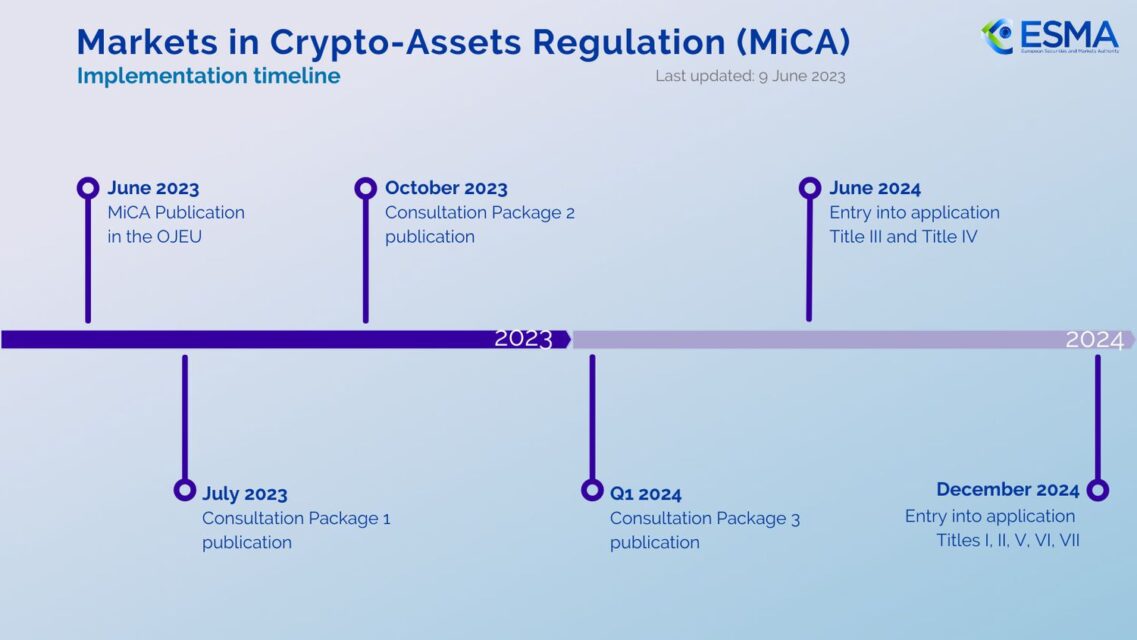
In the US, however, there has been more partisanship and fragmentation of regulatory certainty. (CoinDesk).
In Asia, nations like Japan and South Korea have established more stringent regulatory environments, focusing on investor protection and anti-money laundering measures while maintaining a generally supportive stance towards technological innovation in the crypto space.
International Cooperation in Crypto Regulation
There’s a growing trend towards international cooperation among regulatory bodies to tackle the global nature of the cryptocurrency market.
Forums like the G20 increasingly focus on synchronizing regulatory approaches to cryptocurrencies, aiming to combat financial crimes and ensure a stable international monetary system without stifling innovation.
Future Trends in Global Crypto Policies
The global perspective on cryptocurrency regulation is trending towards more stringent frameworks that require greater transparency and compliance from all market participants.
However, there’s also a significant focus on ensuring these regulations do not hinder the crypto industry’s growth.
Future trends may include more standardized international regulations and possibly global frameworks that facilitate easier cross-border operations of crypto businesses.
These contrasts and patterns draw attention to the various methods and intricacies involved in cryptocurrency regulation across the globe.
Such insights are critical for stakeholders in the cryptocurrency market to anticipate changes and adjust their strategies accordingly.
Expert Opinions and Predictions on Crypto Regulation
From business executives to legal specialists, we will now compile their perspectives on the evolution of cryptocurrency laws, including predictions about future modifications and their possible effects on the market.
Views from Industry Leaders

Prominent figures in the crypto industry have expressed mixed feelings about the SEC’s current regulatory approach.
For example, some executives argue that the SEC’s enforcement-first strategy might hinder innovation and drive crypto businesses offshore. They suggest a more balanced approach, encouraging the SEC to provide clear guidelines that support innovation while ensuring market integrity.
Coinbase’s CEO recently highlighted the challenges of navigating unclear and sometimes contradictory regulations, calling for a regulatory framework that is both clear and fair. This sentiment is echoed by others who fear that without regulatory clarity, the US risks falling behind other nations more openly embracing the crypto economy.
Legal Expert Insights on Cryptocurrency Regulatory Trends
Legal experts closely monitor the evolution of crypto regulations, noting that the SEC’s aggressive stance could set important precedents for other regulators globally.
For instance, experts from Norton Rose Fulbright predict that, regardless of the aggressive approach, the necessity for a balanced regulatory regime that accommodates the unique aspects of cryptocurrencies is inevitable.
A prominent attorney specializing in blockchain technology pointed out, “The regulatory landscape needs to evolve with the technology, not against it.
Regulatory agencies should work with industry leaders to craft laws that protect consumers without stifling innovation”.
Predictive Analysis of Upcoming Crypto Regulatory Changes
Predictions for future regulatory changes primarily focus on the potential for more definitive actions from legislative bodies.
Experts predict that significant legislative efforts will be made in the coming years to create more concrete frameworks for cryptocurrency.
For instance, some predict that Congress might step in to provide the necessary clarity that the SEC has been slow to offer, potentially through new legislation that explicitly addresses the classification of digital assets and their regulatory requirements.
These expert opinions and predictions shed light on the ongoing debate and the possible directions for crypto regulation.
As the industry evolves, these insights will be crucial for stakeholders to navigate the changing regulatory landscape effectively.
Managing Cryptocurrency Regulation in the Future
As we’ve explored throughout this article, the landscape of cryptocurrency regulation is undergoing significant transformations, particularly in the United States. The SEC’s intensified scrutiny and legal actions against major crypto platforms mark a critical juncture for the industry, raising questions about the future of digital asset classification and regulatory compliance.
Summary of Key Points:
- Increased Enforcement:
The SEC is stepping up its efforts to regulate the cryptocurrency space, emphasizing compliance and treating many digital assets as securities, leading to high-profile legal challenges testing the limits of the SEC’s regulatory reach. - Legal and Operational Challenges:
Crypto exchanges and other platforms face significant legal and operational hurdles. The outcomes of ongoing legal battles could dictate operational adjustments and compliance strategies for years. - Global Regulatory Environment:
Comparison with other jurisdictions reveals a varied approach to crypto regulation. While some countries offer more clarity and support for innovation, the US remains a complex, somewhat contentious arena for crypto regulation. - Expert Insights and Predictions:
Industry leaders and legal experts advocate for more precise, balanced regulations that support innovation while ensuring market integrity and investor protection. There is a consensus that legislative action is needed to clarify the regulatory framework for cryptocurrencies.
The future of crypto regulation is poised at a crossroads, with the potential for significant legislative and regulatory changes that could reshape the industry. Stakeholders must stay informed and adaptable, ready to navigate the evolving compliance landscape.
Blockchain
5 Reasons Why Delta Exchange is the Easiest Platform for Crypto Trading Strategies in the Indian Market

Crypto trading in India has grown exponentially in the last few years. In 2025, the market pulled in $258 million in revenue and is on track to hit nearly $732 million by 2033, growing at a 14.3% CAGR from 2026 onwards. That kind of money doesn’t come from people buying Bitcoin on a whim and hoping for a lucky spike. It comes from traders who plan entries, manage exits, build hedges, and run full-blown crypto trading setups.
This shift has created a new problem. Most Indian crypto exchange apps still feel built for basic spot buying without any advanced features to try. You open five tabs, check prices on one app, place orders on another, track risk on a third, and hope nothing slips through.
Delta Exchange transforms the story here. Instead of spots, Delta offers a safe trading platform to explore crypto derivatives (futures and options) across major currencies.
Let’s understand more about Delta Exchange and why so many Indian traders end up sticking with it once they try it.
Why Try Crypto Trading Strategies on Delta Exchange
Ranked among the top Indian crypto exchanges, Delta Exchange offers a range of features and analytics tools to simplify your crypto trading experience.
Here’s why many traders trust Delta Exchange:
- INR trading keeps things simple
If you’ve ever had to convert INR to USDT or USD just to trade Bitcoin, you know the hassle. Delta Exchange lets you deposit and withdraw in INR directly via UPI, IMPS, NEFT, and bank transfer, with your margin and profits shown in INR.
That means no awkward crypto conversions or extra wallets – you fund your account straight from your bank and start crypto trading like it’s normal money.
- Algo trading bots that actually work
Automation can save hours and reduce emotional stress and decisions, especially with fast moves in crypto F&O. Delta Exchange supports algo trading through APIs and bot integrations from platforms like TradingView and Tradetron.
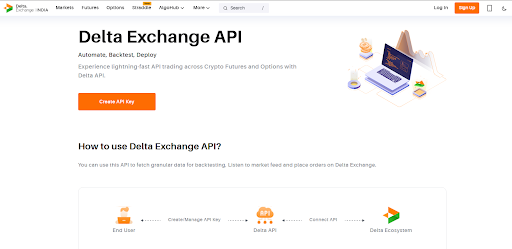
You can link your trading strategy to webhooks or APIs and let bots place trades for Bitcoin futures or other crypto options even when you’re away. If you want systematic, repeatable strategies with fewer missed opportunities, this setup feels practical and real.
And the best part? You don’t need to have any coding knowledge or degree – API Copilot does it all for you.
- Lower trading fees that don’t eat into your wins
Fees matter because every percentage point you pay is one less in your pocket after a winning trade. Delta Exchange offers competitive taker and maker fees, plus a fee cap on options that limits how much you pay on low premium trades.
This helps keep costs predictable, whether you’re trading Bitcoin or ETH futures and options. Traders who place frequent trades or use multi-leg strategies on the Indian crypto exchange can keep more of their gains, rather than having them eaten up by trading fees.
- Strategy Builder for practical trading plans
Strategy planning can get messy if the platform doesn’t help you visualize outcomes. Delta Exchange offers tools that let you craft crypto F&O setups with clear strike choices and expiries, plus daily, weekly, and monthly options for more precise timing. This helps you conveniently plan spreads, straddles, or hedges.
- Compliance and risk measures to know
It’s one thing to trade, another to trust the platform doing it. Delta Exchange is registered with India’s Financial Intelligence Unit (FIU) and follows local KYC and AML rules.
For risk management, the platform supports:
- Margin controls and stop-loss tools that help you manage positions while you trade Bitcoin or other crypto derivatives.
- Demo account to practice trades and understand the market without real money.
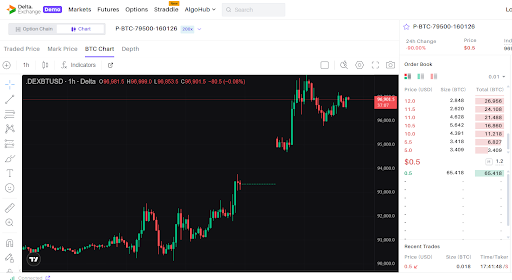
- Payoff charts show you how your trade will play out with breakeven points and maximum P&L.
This way, you can study your crypto trading strategy better before finalizing the trade.
Apart from these, Delta also offers leverage up to 200X – a good way to amplify your profits if the market moves in your favor.
The Bottomline
Indian crypto traders have moved far past the buy-and-hold phase. Spot crypto trading still has its place, yet most active users now want faster ways to make money from price swings, not wait months for a rally.
That’s where crypto F&O, spreads, and short-term setups step in. You want tools that let you react within minutes, control risk, and lock gains when the move shows up.
Platforms that only support basic coin buying just can’t keep up with that style of trading. Serious traders want flexibility, speed, and ways to work with volatility, not sit through it – and Delta Exchange caters to such traders well.
Disclaimer: Crypto trading carries inherent risks due to its high volatility. This article is for informational purposes only. Kindly do your own research before making any investment decisions.
Blockchain
MoonExe Aligns With the Next Phase of Stablecoin Payments as Global Regulation Accelerates

MoonExe today reaffirmed its strategic focus on stablecoin-powered payment infrastructure as global regulatory clarity continues to accelerate across major financial jurisdictions.
Regulators worldwide are advancing frameworks that formally recognize stablecoins as legitimate instruments for payment, settlement, and treasury operations. Legislative initiatives in the United States, expanded licensing regimes in Asia, and structured compliance approaches in other regions are collectively signaling a transition from experimental adoption to regulated, real-world deployment.
As stablecoins move deeper into mainstream financial infrastructure, demand is increasing for platforms capable of delivering real-time liquidity, transparent pricing, and verifiable settlement. MoonExe’s Exchange Finance (ExFi) model is designed to address these needs by enabling stablecoin-based currency conversions that operate continuously, without dependence on traditional banking cut-off times or geographic limitations.
The platform focuses on facilitating efficient value movement while maintaining transparency through public blockchain records. Transactions executed within the MoonExe ecosystem can be independently verified via standard blockchain explorers, reinforcing confidence through auditable, immutable data.
In parallel with regulatory progress, market participants are increasingly prioritizing infrastructure reliability over speculative activity. Stablecoins are being evaluated less as alternative assets and more as operational tools capable of supporting cross-border payments, digital commerce, and treasury flows.
MoonExe continues to expand its infrastructure and partnerships to support this evolution, positioning itself as part of the foundational layer required for stablecoins to function at global scale.
For more information about MoonExe and its stablecoin payment infrastructure, visit https://moonexe.com/
Blockchain
Playmaker to Launch in Q2 2026 as Midas Labs Expands Its AI-Powered Game Creation Ecosystem

Midas Labs, a UK-based Web3 technology company, has announced the upcoming launch of Playmaker, an AI-powered game creation and launchpad platform scheduled for Q2 2026. The platform is designed to lower barriers to game development and funding, operating as a core product within the UNIFI-powered Midas ecosystem.
Playmaker will provide creators, indie studios, and early-stage visionaries with an integrated environment to ideate, build, fund, and publish games without the traditional constraints of large teams or complex technical infrastructure. By combining AI-assisted creation tools with a structured launchpad and marketplace, the platform aims to streamline the path from concept to live product.
According to Jonathan Wheatley, Chief Marketing Officer of Midas Labs, Playmaker represents a natural progression of the company’s ecosystem strategy.
“Playmaker is about enabling participation at every level — from creators and developers to early supporters and players,” said Wheatley. “By integrating AI-driven creation with funding and publishing infrastructure, we’re building a system that allows ideas to move efficiently from concept to execution.”
The platform is powered by the $PLAY token, a fixed-supply utility asset used for project participation, creator payments, marketplace transactions, and ecosystem services. $PLAY operates within the broader UNIFI ecosystem, where UNIFI serves as the access and conversion layer, reinforcing liquidity and alignment across Midas Labs’ products.
Midas Labs has structured Playmaker’s token economy around a non-mintable, scarcity-driven model, designed to support long-term sustainability as platform adoption increases.
The Playmaker launch builds on recent Midas Labs milestones, including the expansion of the Midas Play Marketplace, multiple game releases, ecosystem partnerships, and the rollout of UNIFI staking infrastructure. Together, these components form a vertically integrated environment linking creation, funding, distribution, and participation.
Playmaker is scheduled to go live in Q2 2026, with phased ecosystem access beginning with early contributors before expanding globally.
About Midas Labs
Midas Labs is a United Kingdom–based Web3 technology company focused on building scalable digital ecosystems across gaming, AI, and creator-driven platforms. Powered by the UNIFI token, Midas Labs develops infrastructure designed for long-term participation, real utility, and sustainable growth.
-

 Crypto4 years ago
Crypto4 years agoCardalonia Aiming To Become The Biggest Metaverse Project On Cardano
-
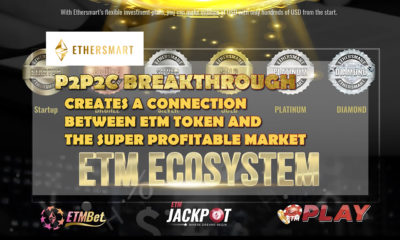
 Press Release5 years ago
Press Release5 years agoP2P2C BREAKTHROUGH CREATES A CONNECTION BETWEEN ETM TOKEN AND THE SUPER PROFITABLE MARKET
-
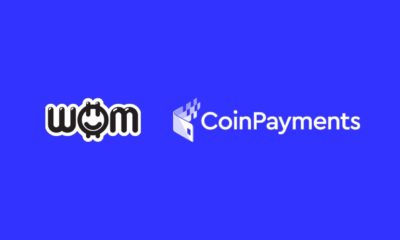
 Blockchain5 years ago
Blockchain5 years agoWOM Protocol partners with CoinPayments, the world’s largest cryptocurrency payments processor
-

 Press Release5 years ago
Press Release5 years agoETHERSMART DEVELOPER’S VISION MADE FINTECH COMPANY BECOME DUBAI’S TOP DIGITAL BANK
-

 Press Release5 years ago
Press Release5 years agoProject Quantum – Decentralised AAA Gaming
-

 Blockchain6 years ago
Blockchain6 years agoWOM Protocol Recommended by Premier Crypto Analyst as only full featured project for August
-
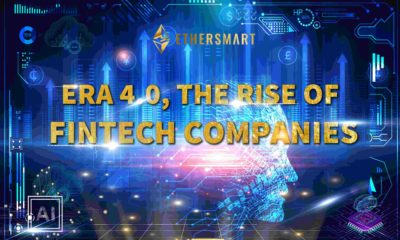
 Press Release5 years ago
Press Release5 years agoETHERSMART DEVELOPER’S VISION MADE FINTECH COMPANY BECOME DUBAI’S TOP DIGITAL BANK
-
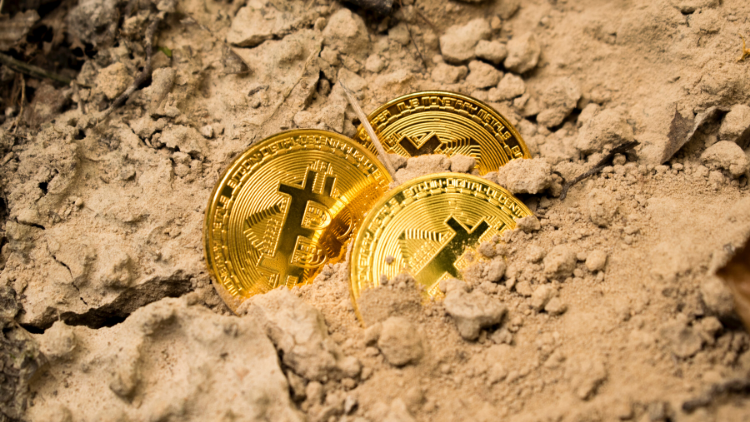
 Blockchain6 years ago
Blockchain6 years ago1.5 Times More Bitcoin is purchased by Grayscale Than Daily Mined Coins






